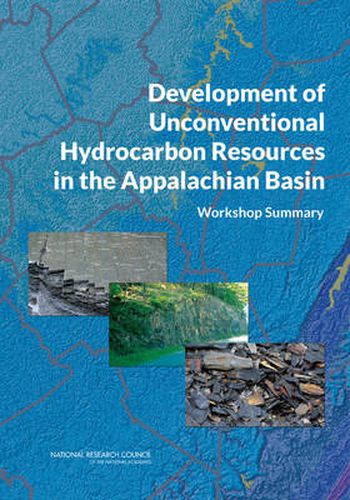Readings Newsletter
Become a Readings Member to make your shopping experience even easier.
Sign in or sign up for free!
You’re not far away from qualifying for FREE standard shipping within Australia
You’ve qualified for FREE standard shipping within Australia
The cart is loading…






Development of Unconventional Hydrocarbon Resources in the Appalachian Basin is the summary of a workshop convened by the National Research Council to examine the geology and unconventional hydrocarbon resources of the Appalachian Basin; technical methods for producing unconventional hydrocarbons and disposing of wastewater; the potential effects of production on the environment; relevant policies and regulations; and priorities for future scientific and engineering research. Workshop presentations by experts in the fields of geosciences and engineering examined the numerous geoscientific aspects of hydrocarbon development from unconventional resources, including natural gas, oil, and natural gas liquids.
Shale gas is the fastest growing source of U.S. natural gas. Most of the oil and gas produced in the United States comes from conventional reservoirs in which hydrocarbons have accumulated in discrete structural or stratigraphic traps below relatively impermeable rock and above a well-defined hydrocarbon-water interface. However, a growing fraction comes from unconventional reservoirs - geographically extensive accumulations of hydrocarbons held in low-permeability rock with diffuse boundaries and no obvious traps or hydrocarbon-water contacts. In the Appalachian Basin, shale gas development is proceeding in Ohio, Pennsylvania, and West Virginia, while New York and Maryland have commissioned studies to assess potential impacts. Development of Unconventional Hydrocarbon Resources in the Appalachian Basin focuses on the main hydrocarbon-bearing geologic formations in and around the Appalachian Basin, including the Marcellus, Utica, and Devonian shales, and their estimated resources, current production levels, and projected output. This report examines the potential effects on surface water and groundwater quality and quantity; potential effects on landscapes, including soil and living organisms, and other environmental systems; and technical and engineering processes for exploration and production.
$9.00 standard shipping within Australia
FREE standard shipping within Australia for orders over $100.00
Express & International shipping calculated at checkout
Development of Unconventional Hydrocarbon Resources in the Appalachian Basin is the summary of a workshop convened by the National Research Council to examine the geology and unconventional hydrocarbon resources of the Appalachian Basin; technical methods for producing unconventional hydrocarbons and disposing of wastewater; the potential effects of production on the environment; relevant policies and regulations; and priorities for future scientific and engineering research. Workshop presentations by experts in the fields of geosciences and engineering examined the numerous geoscientific aspects of hydrocarbon development from unconventional resources, including natural gas, oil, and natural gas liquids.
Shale gas is the fastest growing source of U.S. natural gas. Most of the oil and gas produced in the United States comes from conventional reservoirs in which hydrocarbons have accumulated in discrete structural or stratigraphic traps below relatively impermeable rock and above a well-defined hydrocarbon-water interface. However, a growing fraction comes from unconventional reservoirs - geographically extensive accumulations of hydrocarbons held in low-permeability rock with diffuse boundaries and no obvious traps or hydrocarbon-water contacts. In the Appalachian Basin, shale gas development is proceeding in Ohio, Pennsylvania, and West Virginia, while New York and Maryland have commissioned studies to assess potential impacts. Development of Unconventional Hydrocarbon Resources in the Appalachian Basin focuses on the main hydrocarbon-bearing geologic formations in and around the Appalachian Basin, including the Marcellus, Utica, and Devonian shales, and their estimated resources, current production levels, and projected output. This report examines the potential effects on surface water and groundwater quality and quantity; potential effects on landscapes, including soil and living organisms, and other environmental systems; and technical and engineering processes for exploration and production.